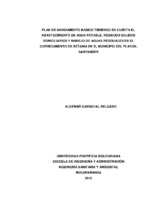Mostrar el registro sencillo del ítem
Plan de saneamiento básico teniendo en cuenta el abastecimiento de agua potable, residuos solidos domiciliarios y manejor de aguas residuales en el corregimiento de Betania en el Municipio del Playon, Santander
| dc.contributor.advisor | Cajigas Cerón, Álvaro Andrés | |
| dc.contributor.author | Sandoval Delgado, Aldemar | |
| dc.coverage.spatial | Seccional Bucaramanga. Universidad Pontificia Bolivariana. Escuela de Ingenierías. Facultad de Ingeniería Ambiental | spa |
| dc.coverage.temporal | 2010 | |
| dc.date.accessioned | 2013-08-28T16:59:47Z | |
| dc.date.available | 2013-08-28T16:59:47Z | |
| dc.date.created | 2010-10-12 | |
| dc.date.issued | 2013-08-28 | |
| dc.identifier.uri | http://hdl.handle.net/20.500.11912/959 | |
| dc.description | 116p.: (pdf); il; gráficas; tablas; anexos | spa |
| dc.description.abstract | Este proceso investigativo se realizó en el corregimiento de Betania, Municipio El Playón Santander dado que, allí existía una preocupante situación ambiental relacionada con el tema de residuos sólidos, tratamiento de las aguas residuales y agua potable. Al respecto, se realizó un diagnóstico para determinar de qué manera afectaba esta problemática a los habitantes del corregimiento y cuáles eran los problemas que exigían una pronta y rápida intervención. Para ello, se aplicó una encuesta que permitió evaluar aspectos físicos y socio cultural de las veredas así como, el reconocimiento de los problemas de abastecimiento de agua, de saneamiento básico y los problemas de salud más frecuentes en la comunidad, entre otros. El análisis de la información y los datos recogidos durante el trabajo de campo, permitió establecer cuáles serían los componentes en los que se debían orientar los programas de saneamiento y su respectivo estudio de costos, para conocer la inversión necesaria y así priorizar las alternativas viables a desarrollar. Por otra parte, se trabajo como complemento la matriz DOFA, se plantea una solución que brindara condiciones ambientales más sanas para los habitantes del corregimiento y así ofrecer una mejor calidad de vida. Finalizado el análisis y la evaluación se planteó el diseño para el plan de manejo, recolección, transporte y disposición final de residuos sólidos reciclables en el corregimiento de Betania, el cual fue la alternativa más factible teniendo en cuenta el mejoramiento y el desarrollo del corregimiento. De esta manera se procedió a la creación de un centro de acopio de residuos reciclables, teniendo en cuenta que la problemática más grave con la que contaba el corregimiento era la producción desmesurada de residuos sólidos, además de esto no se le estaba brindando un manejo adecuado a dichos residuos. Para optimizar el trabajo realizado en el centro de acopio de residuos reciclables se designaron tareas de mantenimiento para que no se descuidara el lugar y se le diera una continuidad al trabajo que se viene llevando a cabo en el corregimiento de Betania. | spa |
| dc.description.abstract | This investigative process was conducted in the village of Betania in the township of Playon, Santander since there was a disturbing environmental situation related to the subject of solid waste, wastewater treatment and drinking water. A diagnosis was made to determinate how this problem affected the inhabitants of the village and what were the problems requiring promp and rapid intervention. To this end, a survey was design to evaluate physical and socio-cultural aspects of the villages and the recognition of the problems of water supply, basic sanitation and health problems common in the community, among others. The analysis of information and data collected during the fieldwork, allowed us to establish what would be the components which should guide the sanitation programs and their respective cost study, to know the investment needed and to prioritize the viable alternatives to develop. On the other hand, the SWOT matrix was worked as a complement that would gave a solution to the inhabitants of the village and would provide healthy environmental conditions for them and offer a better quality of life. After the analysis and evaluation, the management plan was designed for collection, transportation and disposal of recyclable solid waste in the village of Betania, which was the most feasible alternative given the improvement and development to it. In this way we proceeded to the creation of a recyclable waste collection center, taking into account that the most serious problematic that the village had what 4 was excessive production of solid waste, besides that, an adequate management was not being provided to this waste. To optimize the Work done in the recyclable waste collection center, maintenance tasks were designated to not neglect the place and to give continuity to the work that was being undertaken in the village of Betania | |
| dc.language.iso | es | |
| dc.publisher | Universidad Pontificia Bolivariana | spa |
| dc.rights | Attribution-NonCommercial-NoDerivatives 4.0 International | * |
| dc.rights.uri | http://creativecommons.org/licenses/by-nc-nd/4.0/ | * |
| dc.subject | Tesis y disertaciones académicas | spa |
| dc.subject | Ingeniería ambiental | spa |
| dc.subject | Agua potable | spa |
| dc.subject | Residuos sólidos domiciliarios | spa |
| dc.title | Plan de saneamiento básico teniendo en cuenta el abastecimiento de agua potable, residuos solidos domiciliarios y manejor de aguas residuales en el corregimiento de Betania en el Municipio del Playon, Santander | spa |
| dc.type | bacherlorThesis | spa |
| dc.rights.accessRights | openAccess | spa |
| dc.type.hasVersion | publishedVersion | spa |
| dc.identifier.instname | instname:Universidad Pontificia Bolivariana | spa |
| dc.identifier.reponame | reponame:Repositorio Institucional de la Universidad Pontificia Bolivariana | spa |
| dc.identifier.repourl | repourl:https://repository.unab.edu.co/ |
Ficheros en el ítem
Este ítem aparece en la(s) siguiente(s) colección(ones)
-
Trabajos de grado [6698]
Monografías, artículos, informes, proyecto de grado


